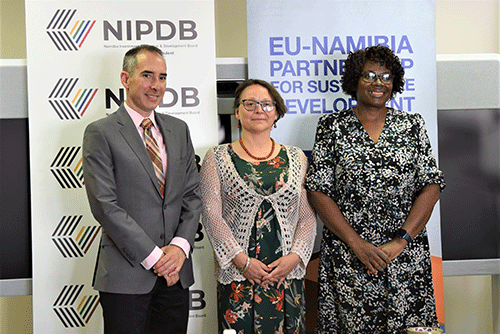The first European Union (EU)-Namibia Business Forum is expected to kick off in Brussels next week on 24 and 25 October. The key objective of the forum is to support Namibia’s investment promotion efforts to attract European foreign direct investment.
“We hope it can facilitate joint ventures to expand green hydrogen production capacity and the development of downstream products,” said Gosia Lachut, Chargé d’ Affaires of the European Union (EU) delegation to Namibia on Tuesday.
Foreign direct investment (FDI) is an ownership stake in a foreign company or project made by an investor, company, or government from another country.
The upcoming business forum will be held under the theme: ‘Mobilising quality investment and value addition for green growth in the EU-Namibia partnership’, with a focus on green hydrogen and sustainable critical raw materials value chains.
A shared objective of the EU-Namibia partnership is to promote economic growth and the creation of job opportunities though sustainable and inclusive green growth transition, she explained.
Lachut commended the Namibian government on their efforts to develop the renewable energy sector. This includes harnessing the country’s world leading solar and wind resources to produce green hydrogen and position Namibia as a green energy hub.
“Very promising in this respect is Namibia’s US$10 billion green hydrogen project, projected to generate two million tonnes of green ammonia annually for regional and global markets including Europe. The EU and member states support Namibia in this ambitious national programme, which requires extensive financial, technical, and human resources, including innovative technology and infrastructure,” Lachut stressed.
She further confirmed the EU’s willingness to support Namibia to further develop a home-grown extractive, refining and recycling industry for raw materials stand and support the green and digital transformation of both Namibia and the EU.
A few months ago, Cabinet resolved to prohibit the exportation of Namibia’s critical minerals in raw form in a bid to create more local jobs, more local value and to boost domestic industrialisation efforts.
This applies to minerals such as unprocessed crushed lithium, graphite, cobalt, manganese, and rare earth elements.
On an encouraging note, it was stated that Namibia exports more to the EU than it imports.
The 2023 EU-Namibia Business Forum has been described as timely because it builds upon the agreement signed by President Hage Geingob and EU Commission President Ursula von der Leyen in 2022. That agreement established a strategic partnership between the EU and Namibia to create and strengthen green hydrogen and sustainable critical raw material value chains in Namibia. -mndjavera@nepc.com.na
In addition, both parties committed to developing an operational roadmap for 2023 and 2024 with concrete actions.
Meanwhile, at the same occasion, Namibia Investment Promotion and Development Board (NIPDB) CEO Nangula Uaandja, noted that even after Namibia was declared as a middle income country, with some economic partners exiting and withdrawing aid support, the EU continued its presence and support.
“While we appreciate the aid support, Namibia is now specifically focusing on building strong trade and investment relationships with our partners. Government has played its enabling role and has opened the door. It is now up to the private sector to seize the opportunity,” Uaandja urged.
Regarding trade figures, traditionally, South Africa remains Namibia’s most significant import source (39%). After that, the EU is the most important trade partner taking up over 21% of Namibia’s exports. Lachut further affirmed that Namibia’s trade balance with the EU has been consistently positive.
Caption: Quality investment… Alberto de la Calle, Spanish ambassador to Namibia, Gosia Lachut, EU Charge d’Affaires, and Nangula Uaandja, NIPDB CEO.
Photo: Contributed


